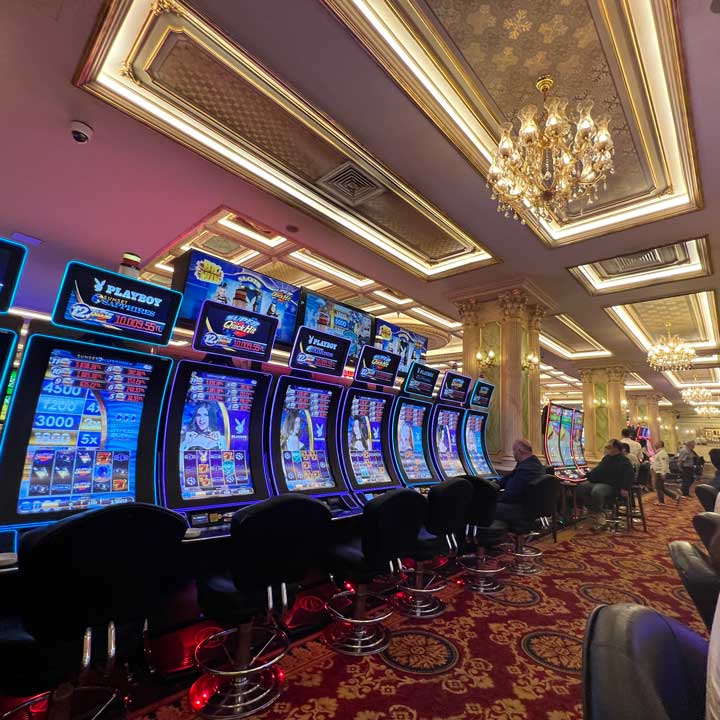The Intriguing Chronicle of Gaming Machines
The saga of fruit machines is a mesmerizing narrative that reflects the development of amusement and betting over the ages. Beginning in their modest beginnings in the 1890s to growing into a fixture in gambling establishments throughout the globe, these chance games have undergone notable transformations. Slot machine games have mesmerized players with their bright designs, immersive storylines, and the hope of wealthy wins.
Initially designed as mechanical machines with rotating cylinders and few symbols, slot machines have evolved into sophisticated digital games that include modern tech and engaging features. Currently, they welcome millions of players, each wanting to hit the jackpot with just the lever pull of a lever or the touch of a tap. Investigating the intriguing background of these devices unveils not just the story of a beloved hobby, but also a mirror of societal changes and progress in technology over the decades.
One of the Birth of Slot Machines' History
A tale of slot machines begins in the late 19th century, a time when machines were becoming popular in entertainment venues. The first true slot machine came into existence by Charles Fey in 1895, referred to as the Liberty Bell. It featured three spinning reels and five symbols: hearts, diamonds, spades, a horseshoe, and the legendary Liberty Bell. Players would pull a lever to spin the reels, and if the symbols aligned in a particular combination, players won a payout. Fey's invention rapidly captured the attention of gamblers and paved the way for future developments in casino slots games.
As the concept of the slot machine gained traction, numerous inventors sought to improve upon Fey's design. By the dawn of the 1900s, these machines were becoming a frequent presence in saloons and amusement parks. In 1907, the first electromechanical slot machine was introduced by Herbert Mills, which featured a more intricate system of payout mechanisms and the iconic fruit symbols that are still linked to slots today. This evolution marked a significant shift in the gaming industry, as machines became more engaging and user-friendly, drawing in more players.
The popularity of slot machines continued to soar throughout the first half of the 20th century, leading to their widespread adoption in casinos across the United States. However, as legal restrictions on gambling during the Great Depression posed challenges for the industry. Many machines were outlawed, but this did not stop innovators. Instead, they adjusted by creating machines that gave out candy or gum instead of cash prizes, effectively circumventing the restrictions while still offering the thrill of a casino slots game. This creativity kept the spirit of gambling intact, setting the stage for the eventual resurgence of slot machines in modern casinos.
Development of Casino Slot Technology
The background of gambling machines started in the late 19th hundred years with the invention of the first mechanical slot machines. A mechanic named Charles Fey, a West Coast craftsman, launched the Liberty Bell slot machine in 1895, which boasted three rotating reels and five icons: hearts, diamonds, spade symbols, a horseshoe, and the Liberty Bell itself. This basic yet engaging layout laid the foundation for the progress of casino slots game, creating an swift attraction for gamblers searching for entertainment and a shot to earn. OK9
As tech matured, so did the design and functionality of slot machines. By the middle 20th century, electronic mechanical machines emerged, adding electrical components to boost gameplay and increase payout opportunities. These developments allowed for more complex features like several paylines and bigger jackpots. The casinos adopted these developments, leading to the growth of casino slots as a major source of profits within the gambling sector, radically transforming the experience of playing slots.

The closing 20th and initial 21st hundred years brought the digital revolution, causing the introduction of digital slots. These gaming units replaced traditional reels with screens, enabling even more imagination in themes and gameplay features. Gamblers could now enjoy rich graphics and sound effects, along with interactive bonus rounds. The transition to web-based gaming further transformed the gambling world, rendering slots accessible to a global audience whenever and wherever, thus marking a fresh chapter in the development of gaming machine innovation.
The Social Influence of Slot Machines
Slot machines have become more than just a means of leisure; they have integrated into the essence of popular culture. Across movies and TV series to music and literature, these famous gaming machines often act as emblems of chance and risk. Films like The Casino and Ocean's 11 prominently highlight slots, depicting them as exciting yet uncertain elements of the casino atmosphere. Their unique attraction lies in the noise of coins falling, the spinning reels, and the vibrant flashing lights, which together create an electric atmosphere that draws people in.
Moreover, slot machines have shaped social gatherings and events, making them a focal point in casinos and gaming venues. Many people do not just visit a casino to gamble; they go for the entire experience, which encompasses the social interactions and the lively ambiance surrounding these machines. Special tournaments and themed gaming nights centered around these games also showcase their popularity, fostering community engagement and shared experiences among players. This community aspect has contributed to the machines' lasting popularity.
The advancement of technology has further transformed this cultural impact. Digital and online slots have broadened access to these games well beyond the walls of physical casinos. Players can now enjoy their favorite casino slots game from home or on the go, leading to the rise of virtual forums and discussion boards where enthusiasts share strategies and experiences. The continuous innovation in game design and the inclusion of storytelling have kept the cultural importance of slot machines alive, attracting new generations of players while maintaining a connection to their historical roots.
